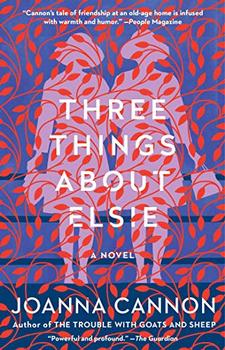Summary | Excerpt | Reviews | Beyond the book | Read-Alikes | Genres & Themes | Author Bio

For fans of A Man Called Ove and the novels of Adriana Trigiani, a charming, delightfully sexy, and bighearted novel starring Auntie Poldi, Sicily's newest amateur sleuth.
On her sixtieth birthday, Auntie Poldi retires to Sicily, intending to while away the rest of her days with good wine, a view of the sea, and few visitors. But Sicily isn't quite the tranquil island she thought it would be, and something always seems to get in the way of her relaxation. When her handsome young handyman goes missing—and is discovered murdered—she can't help but ask questions.
Soon there's an investigation, a smoldering police inspector, a romantic entanglement, one false lead after another, a rooftop showdown, and finally, of course, Poldi herself, slightly tousled but still perfectly poised.
This "masterly treat" (Times Literary Supplement) will transport you to the rocky shores of Torre Archirafi, to a Sicily full of quirky characters, scorching days, and velvety nights, alongside a protagonist who's as fiery as the Sicilian sun.
Giordano has a talent for turning a few words into a portrait-in-depth, an example being his description of a slender young dilettante as looking like every French film director’s dream – "unbearably lonely, ultra-sexy, Sartre-reading Gallic beauty." He’s no slouch either as he deepens the narrative with descriptions of food, sidewalk cafes, and Sicily’s intense blue sky, but nothing’s done better than bringing the wry, and world-wise Sicilian people to the page. Word is that Auntie Poldi is the first of a series, but more courses to come or not, this initial effort is a veritable caponata siciliana – a tasty stew of food and culture, romance and mystery...continued
Full Review
(593 words)
This review is available to non-members for a limited time. For full access,
become a member today.
(Reviewed by Gary Presley).
 Auntie Poldi, in Mario Giordano's Auntie Poldi and the Sicilian Lions, is intrigued when she encounters an unusual tattoo on the murder victim. It's Sicily's trinacria, an heraldic-style image whose origins linger in the shadows of Greek mythology.
Auntie Poldi, in Mario Giordano's Auntie Poldi and the Sicilian Lions, is intrigued when she encounters an unusual tattoo on the murder victim. It's Sicily's trinacria, an heraldic-style image whose origins linger in the shadows of Greek mythology.
Heraldry (the art of devising and displaying armorial insignia) may have begun on the battlefield as a means of identifying a rally point for warriors, or the warriors' allegiance. It's an easy assumption that heraldry could pre-date the written word and historical records. One royal house may have chosen lions rampant, for example, and another the fleur-de-lis, which are both emblems of nobility, bravery, and strength. There are dozens of these ancient emblems that first may have been ...
This "beyond the book" feature is available to non-members for a limited time. Join today for full access.

If you liked Auntie Poldi and the Sicilian Lions, try these:

by Joanna Cannon
Published 2019
The bestselling author of the The Trouble with Goats and Sheep delivers a suspenseful and emotionally satisfying novel about a lifelong friendship, a devastating secret, and the small acts of kindness that bring people together.

by Lucretia Grindle
Published 2013
Alessandro Pallioti, a senior policeman agrees to oversee a murder investigation, after it emerges the victim was once a Partisan hero. When the case begins to unravel, Pallioti finds himself working to uncover a crime lost in the twilight of war, the consequences of which are as deadly today as they were over sixty years ago.
Good as it is to inherit a library, it is better to collect one.
Click Here to find out who said this, as well as discovering other famous literary quotes!